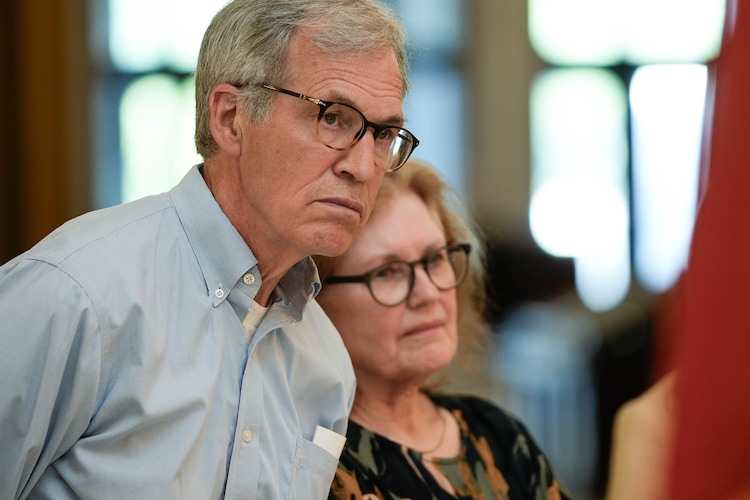Since 2021, Victoria Reid could leave her Millcreek home and in 45 minutes walk through Utah’s four congressional districts that touch every corner of the state.
She would walk by neighbors who were in the same district as people who live in Logan or Blanding before returning to her own block where she shared a member of Congress representing Utahns living in St. George. It left her questioning how she could have more in common with those far-flung parts of the state than the people who live a few blocks away.
She felt like she was being deprived of meaningful representation in Washington, D.C.
“My congressional district extends 120 miles west in Nevada, and 350 miles south to Arizona, and it takes in St. George,” she said during a news conference at the Capitol on Thursday. “How is that for representative democracy?”

(Francisco Kjolseth | The Salt Lake Tribune) Malcolm and Victoria Reid, plaintiffs in the redistricting case, join a news conference at the Utah Capitol, following the Utah Supreme Court’s ruling that the Legislature overstepped its authority when it rewrote a 2018 voter-approved ballot initiative in drawing new congressional districts, Thursday, July 11, 2024.
Thursday the Utah Supreme Court issued a unanimous ruling that the Utah Constitution guarantees citizens the right to change their government through ballot initiatives and, by gutting Proposition 4 the Utah Legislature may have violated that right.
“We hold that when Utahns exercise their right to reform the government through a citizen initiative, their exercise of these rights is protected from government infringement,” Justice Paige Petersen wrote in the opinion. “This means that government-reform initiatives are constitutionally protected from unfettered legislative amendment, repeal, or replacement.”
[READ: Gerrymandering case: Lawmakers can’t ignore Utah voters, Utah Supreme Court rules]
It’s part of the reason that Reid, a Republican, and her husband, Malcolm, a Democrat, became plaintiffs in a lawsuit challenging political boundaries drawn by the Legislature and lawmakers disregard for 2018′s Proposition 4, the Better Boundaries ballot initiative that sought to set up an independent redistricting commission and prohibit partisan gerrymandering.
Wednesday night, the Reids got a message from the lawyers in the case that they had been waiting for: “We won.”
The following evening, dozens of people met at the Utah Capitol to hear plaintiff and leaders from Better Boundaries, Mormon Women for Ethical Government, League of Women Voters discuss the court’s ruling.
The court did not immediately throw out the boundaries that split Salt Lake County into four districts within walking distance of the Reids’ home, but it put the burden on the Legislature to show there was a compelling state interest to undo the will of voters — an extremely high bar that Dave Reymann, one of the lawyers handling the suit, says he believes the Legislature can’t possibly meet.
If Reymann is right, the Legislature will have to redraw new boundaries, not just for congressional districts, but for Utah House, Senate and school board, as well.
“I never expected it to be as definitive and so sweeping, so I’m really, really excited,” plaintiff Malcolm Reid said Thursday afternoon. “I think it’s gonna make a real difference for the state.”
“I’m thrilled. I’m elated,” Victoria Reid said. “I’m glad to see citizens having a vote and a voice and I think this is an important day for representative democracy here in Utah.”
(Francisco Kjolseth | The Salt Lake Tribune) Katie Wright, Better Boundaries Executive Director, is joined by supporters as they gather at the Utah Capitol celebrate a Utah Supreme Court ruling that the Legislature overstepped its authority when it rewrote a 2018 voter-approved ballot initiative in drawing new congressional districts on Thursday, July 11, 2024.
Utah legislative leaders and Gov. Spencer Cox did not share the Reids’ enthusiasm.
House Speaker Mike Schultz and Senate President Stuart Adams issued a joint statement calling the decision “one of the worst outcomes we’ve ever seen from the Utah Supreme Court” and predicted it will turn Utah into California, where, they said, out-of-state special interests spend millions to drive agendas that the Legislature will not be able to change.
In his own statement, Cox cited an amicus brief he submitted to the court last year, in which he argued that the Legislature has the ultimate authority to draw congressional maps, and to amend legislation passed by initiative.
“While I disagree with some of the Court’s analysis and determinations, I respect the role of the Court in our system of government,” the governor wrote, adding that he looks forward to “continuing Utah’s pattern of careful and deliberate policymaking with the best interests of Utahns as the top priority.”
Katie Wright, the executive director of Better Boundaries, sees a different future flowing from Thursday’s ruling.
She sees a state where communities and people can elect people who share their interests and challenges and issues “instead of what we have now which is cities, counties, communities really divided and so many representatives living far away and caring about nothing that affects someone’s everyday life.”
“So the final outcome we’re looking for is representative democracy, where the people in power reflect the values and wishes of the people have to elect them,” she said. “That’s the end game.”










